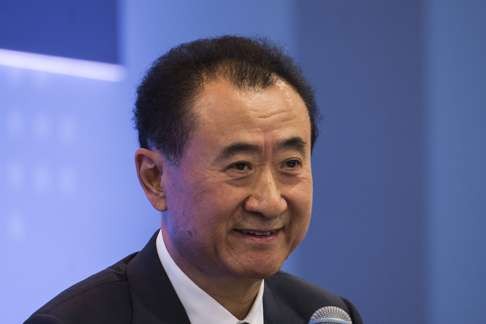
Hong Kong-listed company valuations are not at a loss when compared to mainland markets, HKEX says
HKEX says its research shows perceived benefit in valuation from a mainland China listing little more than “myth”
The Hong Kong stock exchange has tackled what it says is the misconception over the valuation benefits of share listings in mainland China versus the local Hong Kong bourse, as it seeks to stem a mini exodus of companies seeking to delist and relocate to Shanghai or Shenzhen.
The report published by HKEX coincides with efforts by Chinese billionaire Wang Jianlin, Asia’s second richest man, to privatise Hong Kong-listed Dalian Wanda Commercial Properties and relist in China or a better valuation.
The pivot to the mainland share market would be an important step for Wang to achieve his goal of running a business empire with a market value of US$200 billion. The privatisation needs the approval of independent shareholders.
“There has been a general perception that the Hong Kong market has a lower stock valuation
than the mainland market,” according to the research report of Hong Kong Exchanges and Clearing obtained by the Post on Sunday.

“This may give rise to a misbelief that the Hong Kong market is less attractive to issuers for a stock offering and possibly provides less upside opportunities for investors,” according to the report entitled “The myth of ‘low’ valuation of stocks in Hong Kong Market: True opportunities to investors and issuers”.
The report said during 2012 to May 2016, the price-earnings ratios of IPOs in Hong Kong were on average lower than in the Shanghai and Shenzhen. However, consumer goods, energy and health care were offered in Hong Kong with a higher PE ratio at IPO than in the mainland.
“Compared with the mainland market, the new shares issuance regime in Hong Kong is less restrictive and more flexible. The time to market for an IPO application in Hong Kong would be shorter as the application queue is much shorter than in the mainland,” the report said.
Joseph Tong, chairman of Morton Securities, said it is true that many mainland companies prefer listing in Shanghai or Shenzhen for a better valuation than Hong Kong.

“If you are a technology company or a smaller-sized company, the price to earning ratio of these companies are trading higher in Shanghai or Shenzhen than in Hong Kong. This is because the mainland market is dominated by retail investors who like to play with concept or smaller size stocks. They pay an unreasonable high price to speculate on these companies in the hope their shares rocket higher,” he said. “In Hong Kong, where is a more mature market and traded by international investors, the PE ratio is more reasonable.”
The research report however said on a macro level, the valuation between Hong Kong and the mainland markets were similar when it comes to bigger companies.
As of the end of June, the benchmark Hang Seng Index, which tracks 50 listed companies, had a PE ratio at 8.87, while its counterpart SSE 50 Index which tracks the largest 50 companies in the Shanghai Stock Exchange has a PE ratio of 9.25.
However, when compared with smaller size companies in Shanghai, the SSE380, which covers 380 stocks, has a PE ratio of 41.45 while the Shenzhen Component Index that cover 500 stocks listed in Shenzhen has a PE ratio of 31.70, while the Nasdaq-style ChiNext in Shenzhen trades at a PE of 77.71.
The report said the high stock valuation in the mainland market also include liquidity premium. In addition, China does not have many hedging tools for rational pricing strategies while Hong Kong has more derivative products for the purpose.
“Given the price differentials between the Hong Kong and Mainland markets at the macro and micro levels, the Hong Kong market does offer opportunities to issuers and investors in respect of the lower priced H shares of AH stocks,” the report said.
“The most important of all is the international status and global expansion opportunities offered by the Hong Kong market to Mainland enterprises.”

